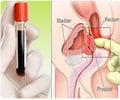High levels of Bisphenol A in the urine of men could be a marker of prostate cancer and low levels could cause cellular changes in malignant and non-malignant prostate cells, a new study found

BPA, an environmental pollutant with estrogen activity, is used to make hard, clear plastic and is common in many food product containers. It has been linked to neurological defects, diabetes and a number of cancers, including breast and prostate.
Principle investigator Shuk-mei Ho, PhD, director of the Cincinnati Cancer Center, Jacob G. Schmidlapp Chair of Environmental Health and professor at the University of Cincinnati College of Medicine, says that human exposure to BPA is a common occurrence and that animal studies have shown that BPA contributes to development of prostate cancer but that human data are scarce.
"Prostate cancer is the second most common cancer among men in North America, and one in six men will develop it over their lifetime," she says. "However, the cancer is rarely diagnosed in men under the age of 40 with almost two-thirds of cases reported in men at age 65."
"Major contributing factors other than age are race and family history, whereas little is known about the impact of endocrine disruptors on prostate cancer."
Ho says that in the United States, exposure to BPA is widespread—exceeding 90 percent in the general population—and that absorption through the skin, inhalation and ingestion from contaminated food and water are the major kinds of exposure.
Advertisement
"However, human studies linking BPA exposure to heightened cancer risk are limited," she continues. "Our study examined the association between urinary BPA levels and prostate cancer and assessed the effects of BPA on the initiation of centrosome abnormalities as an underlying mechanism promoting prostate cancer formation."
Advertisement
In the study, researchers assessed the PSA of 60 urology patients using urine samples. Higher levels of BPA were found in prostate cancer patients than in non-prostate cancer patients (5.74 μg/g creatine versus 1.43 μg/g creatine), and the difference was even more significant in patients less than 65 years of age.
Additionally, researchers examined prostate cells—normal and cancerous—using immunofluorescence, allowing them to visualize the distribution of the target molecule and look specifically at centrosomal abnormalities and growth patterns.
"Exposure to low doses of BPA increased the percentage of cells with centrosome amplification two- to eight-fold," Ho says. "BPA is not a recognized carcinogen, and questions surrounding the mechanism behind the positive correlation of BPA exposure with prostate cancer have arisen".
"Several studies have shown that centrosome amplification is a major contributing factor to chromosomal mutation in human tumors. We examined the centrosome profile of prostate cancer cells treated with BPA and found that treatment with BPA increased the number of cells with abnormal centrosomes".
"All of these findings reveal a previously unknown relationship between BPA exposure and prostate cancer and suggest a mechanism underlying the role of BPA in cellular transformation and disease progression. With this insight, we hope to further investigate ways we can decrease exposures to potentially cancerous-causing chemicals in every day products and substances and reduce the onset of prostate cancer in men."
Source-Eurekalert

![Prostate Specific Antigen [PSA] & Prostate Cancer Diagnosis Prostate Specific Antigen [PSA] & Prostate Cancer Diagnosis](https://images.medindia.net/patientinfo/120_100/prostate-specific-antigen.jpg)










